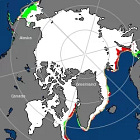Another Colder Than Average Month In Antarctica; UK Prematurely Ends 142-Year Reliance On Coal Power; + The Noose Pt 2
Attacking cheap and reliable energy has become a central pillar of their strategy.
Another Colder Than Average Month In Antarctica
The provisional monthly average for September at the South Pole Station was -59.1C (-74.4F), which is -0.3C below average.
The media and activist-scientists alike were up in arms over a mild July and August in parts of Antarctica, yet the monthly mean temperature anomalies over the past 12 months, using the 1991-2020 reference for the South Pole Station and 1958-2023 for Vostok, show consistent negative anomalies—facts these charlatans conveniently ignored.
In October, the South Pole recorded an anomaly of -1.9C, while Vostok posted -1.3C. November saw a -1.2C at the South Pole and -3C at Vostok. In December, the anomalies were -1.4C and -2.5C, respectively. January recorded anomalies of -3.2C and -2.4C, again respectively. For February, -1.3C was noted at the South Pole and -1.7C at Vostok. March saw both stations post an anomaly of -1.1C. While April saw the South Pole Station average -59.6C, which came in at -2.2C below the multidecadal baseline.
Antarctica has been cooling since reliable temperature data has been available.
The year 2021 saw an intensification of this cooling, with the South Pole registering its coldest winter on record (April – Sept) in books dating back to the 1950s. The freeze has endured ever since — the article below looks at the data in more detail:
UK Prematurely Ends 142-Year Reliance On Coal Power
On Monday, the UK ended its 142-year reliance on coal power, a move that gambles with the country's energy security.
Keep reading with a 7-day free trial
Subscribe to Electroverse Substack to keep reading this post and get 7 days of free access to the full post archives.




